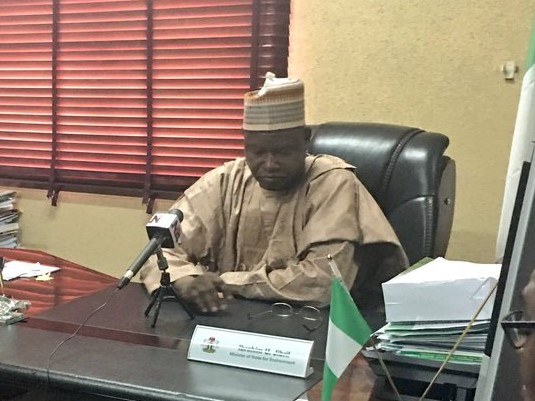The Federal Government says it is committed to addressing the sanitation challenges including ending open defecation in the country and ensuring proper management of excreta.

Alhaji Ibrahim Jibril, the Minister of State for Environment, said this at the 2018 World Toilet Day Ministerial Press Briefing on Tuesday, November 13, 2018 in Abuja.
The minister, who was represented by the Permanent Secretary, Mr Leon Aliboh, said that the commitment was demonstrated by the President Muhammadu Buhari’s recent declaration of state of emergency on water, sanitation and hygiene in the country.
He said that the celebration, with the theme: “When Nature Calls’,’ was quite apt as it drew attention to the fact that “you and I cannot avoid or ignore the call of nature and the environmental health challenges associated with poor management of toilet, faeces and sewage.’’
“It focuses on the reawakening of societal consciousness on the importance of having eco-friendly sanitary facilities in every household and ensuring proper management of sewage.
“This year’s commemoration focuses on toilet and nature, raising awareness and inspiring action to tackle global sanitation crisis.
“It also aims to promote access to toilets for everyone everywhere, end open defecation and ensure that toilet construction, operation, use and management are ecosystem friendly,’’ he said.
Jibril noted that access to sanitary facilities remained a mirage to a vast majority of Nigeria’s citizens.
“Today, 4.5 billion people in the world live without safe toilet and 892 million people still practice open defecation, as many people still use the bush and water bodies as their regular means for excreta disposal.
“Many institutions do not have sanitary facilities and where they exist, they are either not functioning well or are misused.’’
He said that one of the major consequences of poor excreta disposal was the high rate of diarrhea disease being the cause of the second highest rate of morbidity and mortality among children under the age of five.
“The persistent re-occurrence of annual incidences of cholera outbreak in some of our states and the occurrence and re-occurrence of other excreta related diseases are also manifestations of inadequate toilet facilities.
“Yet this could also be prevented through safe excreta disposal by every individual.
“I therefore challenge all stakeholders on environment, particularly sanitation at national, state and local government levels, to not only talk, but take practical steps and actions as agents of change to ensure everyone has access to eco-friendly sanitary facilities.’’
He said that the ministry in collaboration with other stakeholders had put together series of activities to mark the 2018 World Toilet Day.
“We have school pupils sensitisation (competition and education through game and artwork), sanitary inspection of Federal Government premises, community awareness campaign and sanitary inspection of markets and motor parks,’’ he said.
The theme of the World Toilet Day is: “When nature calls, please think healthy and safe environment’’.
Nov. 19 of every year is marked as World Toilet Day as declared by the United Nations General Assembly in 2013.
Dr Domnic Abonyi, the Registrar, Environmental Health Officers Registration Council of Nigeria (EHORECON), said safe toilet must follow some criteria.
“For toilet to be safe and sound, the criteria to solve the purpose of toilet must include, it should not be unsightly, should not have access to flies, fresh faeces should not be handled and should be devoid of odour.
“Individual should provide for themselves, family and community any type of toilet suitable to their finances provided that the ecstatic criteria are considered.
“The basic thing for those who cannot afford the most standard toilet can dig the site they want for the toilet, void the faecal matter and cover it.
“This should be done in a way that flies cannot get access to it, nobody will see it and you cannot remove or handle with your hand,’’ he said.
He said that emphasis was on individuals and families to get a toilet system they could operate and maintain.
“Basically, the need is for us to avoid seeing bigger matter like cholera that could be avoided,’’ he said.
By Ebere Agozie
